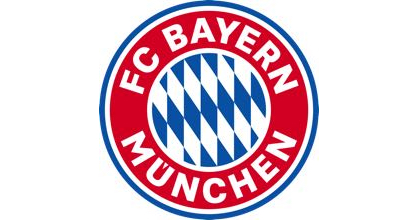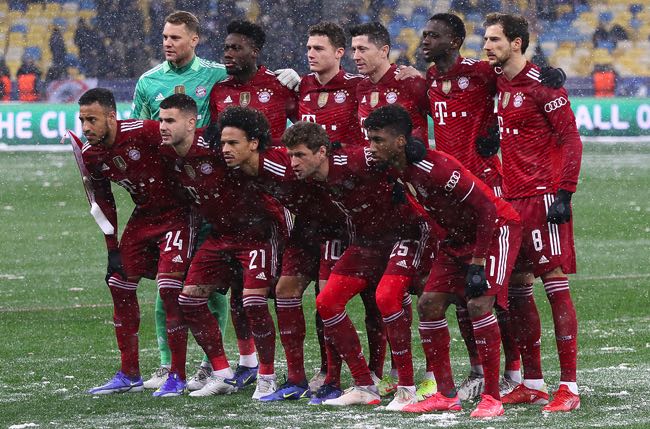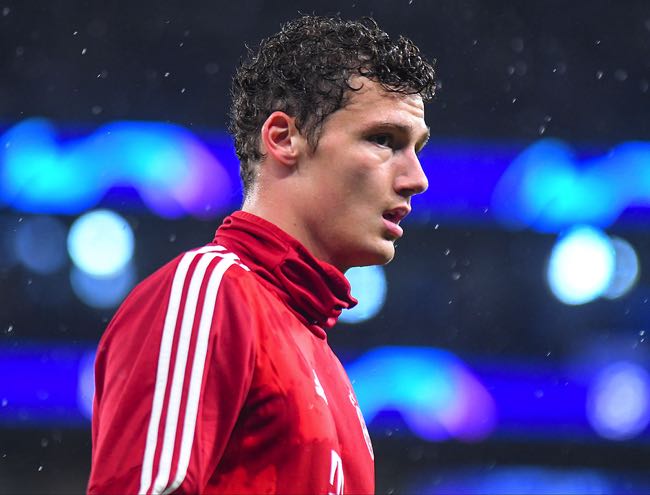 Bayern Munich are by far the biggest side in Germany and, known as FC Hollywood, they are also one of the most successful and famous clubs in the world. They have 32 Bundesliga titles to their name and incredibly 17 of those have come in the 21st century. Say what you like about the competitiveness of the German top flight but that is a scarily good record.
Bayern Munich are by far the biggest side in Germany and, known as FC Hollywood, they are also one of the most successful and famous clubs in the world. They have 32 Bundesliga titles to their name and incredibly 17 of those have come in the 21st century. Say what you like about the competitiveness of the German top flight but that is a scarily good record.
But domestic success is not our focus here and instead we will be detailing how the kings of Bavaria have got on in the European Cup (as this competition was known until 1992) and the UEFA Champions League (UCL) as it was rebranded that year. Throughout this article we will use those names interchangeably as we take a look at how Bayern have done in this famous contest, focussing on their (spoiler alert!) victories and the finals they have made, as well as the odd time when they have come unstuck unexpectedly.
Note that the info throughout this feature is correct as of the start of the 2022/23 UCL campaign.
When Did Bayern Munich Last Win the Champions League?
Bayern Munich won the Champions League on the 23rd of August, 2020 in front of a huge official crowd of zero (due to global health restrictions at the time) at the Estadio da Luz in Lisbon. They capped their 2019/20 campaign in perfect style by getting the better of Paris Saint-Germain in Portugal, winning 1-0.
Champions League Finals
The Munich giants are one of the most successful sides in this pan-European cup, as well as dominating domestically. Statistically speaking, they are the third-most successful side overall, courtesy of their six wins and five final defeats. Liverpool have also won six European Cups but Bayern are ranked a shade higher as they have made one more final than the Merseyside outfit. Only Juventus (seven) have lost more UCL finals than Bayern’s five and you can see a summary of their 11 finals below.
| Year | Opponent | Result | Score |
|---|---|---|---|
| 2020 | Paris Saint-Germain | Won | 1-0 |
| 2013 | Borussia Dortmund | Won | 2-1 |
| 2012 | Chelsea | Lost | 4-3 on penalties (1-1 after 90 minutes and extra time) |
| 2010 | Inter Milan | Lost | 2-0 |
| 2001 | Valencia | Won | 5-4 on penalties (1-1 after 90 minutes and extra time) |
| 1999 | Manchester United | Lost | 2-1 |
| 1987 | Porto | Lost | 2-1 |
| 1982 | Aston Villa | Lost | 1-0 |
| 1976 | St Etienne | Won | 1-0 |
| 1975 | Leeds United | Won | 2-0 |
| 1974 | Atletico Madrid | Won | 4-0 in replay after 1-1 draw in extra time (0-0 after 90 minutes) |
Stage of Elimination
Given the domestic dominance of the Germans, especially in recent times, it is no surprise to see that they have featured in this contest many times, both before it expanded and, of course, in the Champions League era. Below is a summary of the stage at which the Bavarians have been eliminated, although note that not all stages have existed in all seasons due to the evolving structure and format of the competition.
| Stage | Number of Times | Percentage |
|---|---|---|
| Won | 6 | 16% |
| Final | 5 | 13% |
| Semi Final | 9 | 24% |
| Quarter Final | 12 | 32% |
| Round of 16 | 4 | 11% |
| Group Stage 1 (in year with two) | 1 | 3% |
| First Round | 1 | 3% |
Note that the total of the percetnages does not equal 100% due to rounding.
Bayern’s six wins and 11 finals shows just how good they have been in this competition but if we explore the stats a little more deeply, they have been even more impressive. Very few sides have qualified for the UCL as often as the Bavarians and, moreover, when they have entered, they have got to at least the quarter final stage 84% of the time! That really is amazing, and they have made the semis (or better) more than half the time. Only Real Madrid can better their 20 appearances at the semi final stage, the Spanish maestros appearing, incredibly, at that stage of the competition 31 times!
Times Bayern Munich Won the Cup

katatonia82 / Bigstockphoto.com
Technically speaking, Bayern have won three Champions League trophies and three European Cups. We will look at the former first, before taking a closer look at the fantastic team FC Hollywood had in the 1970s that delivered an incredible hat-trick of European Cup victories in successive years.
2020: Powerful Bayern Storm to Sixth Title
FC Hollywood most recently lifted the UCL trophy in 2020, beating PSG, whose quest to win the game’s biggest club prize goes on, 1-0 in a disappointing finale. Man of the Match, Kinglsey Coman, scored the game’s only goal after 59 minutes, heading on from a Joshua Kimmich cross. In what was PSG’s first, and to date only, UCL final, Bayern were the better side and deserved the win, though neither side created all that much.
The Germans had made the final by winning Group B with a 100% record. It was far from the toughest quartet in the draw but they beat Spurs into second spot and absolutely walked it. Their goal difference across six group matches was +19, including a 7-2 battering of Tottenham in north London and a 6-0 win at Red Star Belgrade.
The goals continued to flow in the last 16 as they humiliated Chelsea 7-1 on aggregate and then, as unlikely as it may seem, improved on that in the quarter finals against Barcelona. Due to the global health crisis, games were held over a single leg but somehow Bayern won 8-2. Yes, 8-2! The game was played at a neutral venue and the Germans ran riot, Phillipe Coutinho, on loan from Barca, netting two of the goals.
Like all four quarters, the semis were held over one match and played in Lisbon. Lyon must have feared the worst given the form Hansi Flick’s men were in but in the end it was “just” 3-0 to Bayern. The final may not have been as emphatic as many of the German team’s other wins but even so, they kept a clean sheet and overall won every single game of that year’s UCL in normal time, a stunning accomplishment.
2013: Bayern Prevail in all-German Final
There have been a number of UCL finals between clubs from the same country and in the 2012/13 season it was Borussia Dortmund who Bayern faced. To date, this is the only all-German final we have seen in the tournament and, as we know, Bayern prevailed 2-1, the clash taking place at Wembley Stadium. Dortmund were the underdogs, though they had won the Bundesliga in 2011 and 2012, with Jurgen Klopp at the helm.
Klopp was in charge for this match too, with Jupp Heynckes in the opposite dugout. The game was goalless for an hour but then sparked into life, Mario Mandzukic netting for the Bavarians. Dortmund equalised in the 69th minute though an Ilkay Gundogan penalty but with just a minute left on the clock Man of the Match Arjen Robben bagged the winner.
It was a fairly even game, though Dortmund tired in the later stages and was the second part of what would turn into a treble for Bayern. They had already won the league and shortly after the Champions League success they added the German cup to their haul too. Even so, at the end of the campaign Heynckes had to leave, a certain Pep Guardiola placing him as Bayern head coach.
2001: Double Pain for Valencia
Bayern’s fourth UCL title came a quarter of a century after their third, the club ending their long wait by beating Spanish outfit Valencia on penalties at Milan’s San Siro. Valencia had lost the final 12 months earlier too so this was a really cruel blow to take.
The Germans were the better side in a game which ended 1-1 after 90 minutes, both goals coming from the spot, both scored by their side’s captain. Even more strangely, Bayern also missed a penalty in a game that would ultimately be defined by spot-kicks. Gaizka Mendieta put his side ahead after just three minutes but Bayern got their own penalty just after half time, Stefan Effenberg converting.
The teams could not be separated by extra time and things looked good for the Spaniards when their opponents missed the first penalty of the shootout. However, even though Bayern also failed with their fourth penalty, Valencia’s takers also fluffed their lines, Zlatko Zahovič, Rubén Baraja and finally future Southampton manager Mauricio Pellegrino missing as the Germans won 5-4.
Bayern had earlier beaten Real Madrid and Man United in the semis and quarters respectively. Coincidentally in both ties they won 1-0 in the first leg and 2-1 at home. Prior to that Bayern topped Group C ahead of Arsenal, taking 13 points from their six games with the Gunners, Lyon and Spartak Moscow.
1974-1976: Glorious Hat-Trick
One of the many debates football geeks love to have concerns the greatest sides of all time. There are a number of teams who sure to feature in such a discussion, such as Brazil’s 1970 group, the Spain side that won three consecutive major tournaments between 2008 and 2012, Barcelona’s team from around the same time, Hungary’s Mighty Magyars and many more. Bayern’s team from the mid-1970s are among that elite, providing the core of a brilliant West German side from the same period.
Bayern won three European Cups in a row from 1974 to 1976 inclusive and boasted all-time greats, such as Gerd Muller (68 goals in 62 games for West Germany), Franz Beckenbauer (Ballon d’Or winner in 1972 and 1976), keeper, Sepp Maier (95 international caps and 599 appearances for Bayern) and Uli Hoeneß. They were a formidable unit who could steamroll teams and boasted so much attacking talent, plus the brilliance and leadership of Beckenbauer, who came to define the roll of sweeper.
In 1976 they saw off St. Etienne in the final, winning 1-0 with a goal from Franz Roth, having beaten Real Madrid in the semis. In the quarters, they recorded a 5-1 aggregate win over an excellent Benfica side and also beat Malmo (2-1) and minnows Jeunesse Esch (8-1) over two legs.
Twelve months prior to that they won their second European Cup by defeating Leeds United in a highly controversial final in Paris. The game ended 2-0 to Leeds but riots that followed the game (and incidents that took place during the game) led to Leeds being banned from Europe for four years (reduced to two on appeal).
Fans of the West Yorkshire side were unhappy about a number of highly dubious refereeing decisions, chiefly two rejected penalty claims, at least one of which was valid, and a disallowed goal that was harshly given for offside against a player not interfering with play. Leeds players have said that Beckenbauer essentially granted the offside, pressuring the referee after the goal was initially awarded.
Bayern had come into the game as big favourites but in truth Leeds deserved more. The referee was not officially investigated but was ranked by officials as very poor but, of course, as far as fans of the German side believe, all that matters is the fact that it was another piece of silverware for their club. They had received a bye through the first round as champions, subsequently defeating East Germans FC Magdeburg, Armenian (then Soviet) side Ararat Yerevan and, in the semis, St Etienne.
Their first victory, both of this hat-trick and indeed Bayern’s entire history, came on the 17th May 1974, two days after the European Cup final. How so? The Germans did it the hard way first time out, needing a replay to get past Atletico Madrid after the first match (on the 15th) finished 0-0 after 90 minutes and then 1-1 after extra time. The Germans only forced the replay thanks to a goal from Hans-Georg Schwarzenbeck in the 120th minute of the tie, arguably the most important strike in the history of the club.
Both games were played in Brussels, at the now-infamous Heysel, but the replay was very different from the first clash, Udo Lattek’s men hammering the Spanish side 4-0, with both Muller and Hoeneß netting braces. If the replay was a stroll in the park, the rest of Bayern’s adventure was very different.
The Bavarian side were involved in some thrillers to book their spot in the final, beating Atvidabergs FF of Sweden on penalties after the tie finished 4-4 on aggregate. They then squeezed past East German rivals Dynamo Dresden 7-6 on aggregate before beating CSKA Sofia 5-3 in the quarters. Their semi final was less stressful for fans and staff as they beat Hungarian side Újpest 3-0 in the second leg to progress 4-1.
Bayern Munich’s Worst Upsets

Cosmin Iftode / Bigstockphoto.com
When a side has made the quarter finals 84% of the time there can be two ways of considering their disappointments: either they have been few and far between, or, more harshly, anything short of the semis is a poor performance. We choose to take the former view, so will only consider the truly lowest of the lows.
Once again, there are different ways to think about this, and one obvious port of call is the time that the Germans fell at the first hurdle. This happened first in 1969/70 when they were defeated by French side, St. Etienne, 3-2 in the first round. St Etienne were then eliminated by Legia Warsaw in the next round so this was a very poor show.
More recently, in 2002/03, they fell at the Group Stage for the only time in their history. Incredibly, they failed to win a single game against Milan, Deportivo La Coruna or Lens and finished bottom of the pile with just two points. That was an incredibly poor attempt as they trailed third-placed Lens by six points and even more shocking given they had won the UCL in 2001.
Another terrible result for them in this tournament, that stands in isolation rather than as a poor performance that season, came in 2014. They were defending champions and well fancied in their semi against Real Madrid having beaten Arsenal and Man United to make it that far. They lost 1-0 in Spain – a decent enough result – but suffered a horror show on home soil. They were put to the sword in front of 68,000 fans at the Allianz Arena, losing 4-0 to crash out 5-0 on aggregate.
